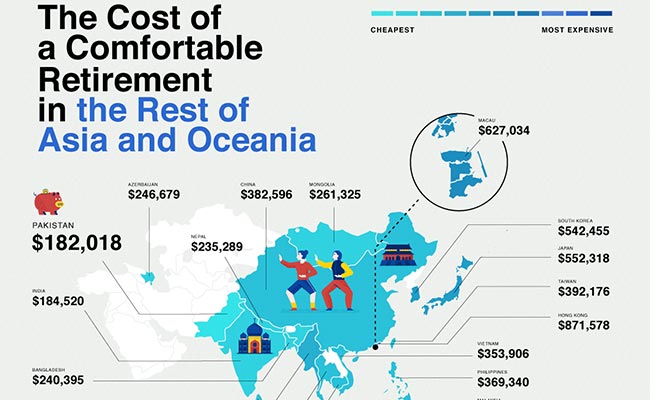Did you know there is a minimum wage for foreign nationals working in Thailand?
How much you get paid depends on your country of origin. Here's how it works out:
- 60,000 Baht/month: Canada, Japan and the United States of America
- 50,000 Baht/month: Europe (including the United Kingdom) and Australia
- 45,000 Baht/month: Hong Kong, Malaysia, South Korea, Singapore and Taiwan
- 35,000 Baht/month: China, India, Indonesia, the Middle East and the Philippines
- 25,000 Baht/month: Africa, Cambodia, Laos, Myanmar and Vietnam
If you're a teacher reading this you might be asking yourself why you're getting paid less than the minimum wage. Well, the bad news is that teachers are excluded from this rule because the Ministry of Education oversees teaching separately.
The starting salary range for a teacher ranges from 20,000 Baht/month to 35,000 Baht/month, depending on the country of origin.
For example, a native English speaker from the UK, Australia, Canada or the US, teaching in a public school, would start on 30-35 k Baht/month, whereas a non-native English speaker from the Philippines would start on 20-25 k Baht/month.
International school teacher salaries start from approximately 50-70,000 Baht/month and increase yearly.
The rule is supposed to be that you can't get a work permit unless you are being paid the minimum wage according to your country of origin.
Why Are Wages Higher for Foreign Nationals?
In a nutshell, to attract foreign workers to Thailand.
Would you come here and work full time for 10 or 15,000 Baht/month? Neither would I.
Regardless of the minimum wage, foreign-owned Thai companies, multinational companies, NGOs and foreign government agencies have to pay higher wages to attract skilled foreign nationals into roles in Thailand.
The higher wages also push foreign nationals into a higher tax bracket to ensure they will pay tax, which in turn stimulates the economy.
Salary Discrimination
Coming from the UK, it seems odd to pay people from certain countries less than others. I've seen this firsthand on my job board, in teaching in particular, with some nationalities being offered considerably less than others.
It's an uncomfortable situation.
Pay should be based on experience and ability, not nationality.
I mean, imagine you're from Hong Kong and you start a role in a company on the same day as someone from the US. You've both been employed in the same role, are roughly the same age and have similar experience. Yet because of you come from a different country you are paid less.
That needn't happen, though. Both employees could be paid the same, as long as the employer meets the minimum wage requirement for the higher earning nationality. In reality, where possible, some employers will try to pay the lowest wage they can.
Where teaching is concerned, I guess a case can be made for native English speakers earning more because they should have a better understanding of the language and naturally have more experience speaking it.
However, in my experience there are non-native speakers who can speak English, and understand grammar rules, just as well as many native speakers.
For example, surely a person from Turkey, educated at a private school in the UK and working in Thailand, should be paid the same or more than his/her UK colleagues?
What are your thoughts on this?
Minimum Wage Enforcement
Do companies in Thailand even abide by the minimum wage guidelines?
Not all, no.
Many use the requirement to their advantage to pay people less, but often end up paying less to those who should be getting more, relying on the fact that most people don't know about the minimum wage.
Let's face it, there's no way those builders from Laos are getting 25,000 Baht per month!
When it comes to real estate jobs and the like, some employers may get around the rule by including commission or bonus potential in the total salary.
The Thai Minimum Wage
There is a minimum wage for Thais, though it's still too low in my opinion.
Take the Bangkok minimum wage of 353 Baht per day, for example. That's 7,000 Baht per month! Out of that you have to pay rent, food, travel and save for the future. Imagine trying to provide for a child on that wage!
This is why in most cases both parents have to work, and why many kids end up being brought up by their grandparents back in the provincial home.
To be fair though, there have been two wage rises in the last 3 years.
The minimum wage is set by province, and works out somewhat strangely in some instances.
I mean, one can understand Bangkok having a higher minimum wage than Chiang Mai because of the difference in cost of living. But why would you get paid 6 Baht a day less in Maha Sarakham than in Kalasin?
The two are barely 30 minutes from each other, and the former is closer to Khon Kaen – a university city – where you get paid 2 Baht more a day than in Kalasin. Surely, in this case, those living closer to the city should be paid more?
When you look through the list below you will find numerous examples like this.
Apparently, provincial wage committees, often heavily influenced by employer representatives, set the minimum wage rates.
Baht (THB) Per Day by Province:
- Chiang Mai – 340.00
- Chiang Rai – 332.00
- Phetchaburi – 335.00
- Phetchabun – 335.00
- Loei – 335.00
- Phrae – 332.00
- Mae Hong Son – 332.00
- Krabi – 340.00
- Bangkok – 353.00
- Kanchanaburi – 335.00
- Kalasin – 338.00
- Kamphaeng Phet – 332.00
- Khon Kaen – 340.00
- Chanthaburi – 338.00
- Chachoengsao – 345.00
- Chon Buri – 354.00
- Chainat – 335.00
- Chaiyaphum – 332.00
- Chumpon – 332.00
- Trang – 332.00
- Trat – 340.00
- Tak – 332.00
- Nakhon Nayok – 338.00
- Nakhon Pathom – 353.00
- Nakhon Phanom- 335.00
- Nakhon Ratchasima – 340.00
- Nakhon Si Thammarat – 332.00
- Nakhon Sawan – 335.00
- Nonthaburi – 353.00
- Narathiwat – 328.00
- Nan – 328.00
- Bung Kan – 335.00
- Buri Ram – 335.00
- Pathum Thani – 353.00
- Prachuap Khiri Khan – 335.00
- Prachin Buri – 340.00
- Pattani – 328.00
- Ayutthaya – 343.00
- Phayao – 335.00
- Phang-nga – 340.00
- Phatthalung – 335.00
- Phichit – 332.00
- Phitsanuloke – 335.00
- Phuket – 354.00
- Maha Sarakham – 332.00
- Mukdahan – 338.00
- Yasothon – 335.00
- Yala – 328.00
- Roi-et – 335.00
- Ranong – 332.00
- Rayong – 354.00
- Ratchaburi – 332.00
- Lop Buri – 340.00
- Lampang – 332.00
- Lamphun – 332.00
- Si Sa Ket – 332.00
- Songkhla – 340.00
- Sathun – 332.00
- Samut Prakan – 353.00
- Samut Songkhram – 338.00
- Samut Sakhon – 353.00
- Sa Kaew – 335.00
- Saraburi – 340.00
- Sakhon Nakhon – 338.00
- Sing Buri – 332.00
- Sukhothai – 332.00
- Suphan Buri – 340.00
- Surat Thani – 340.00
- Surin – 335.00
- Nong Khai – 340.00
- Nong Bua Lamphu – 332.00
- Ang Thong – 335.00
- Amnat Charoen – 332.00
- Udon Thani – 328.00
- Uttradit – 335.00
- Uthai Thani – 332.00
- Ubon Ratchathani – 340.00
Last Updated on



kelvin bamfield says
The above caused monumental shifts in money, bankruptcies, psychological damage, family breakdowns, DEBT
The cost of gas is the catalyst for the supply chain getting a whipping. Everything has gone up. Staff are demanding pay rises to compensate for the known effects of gasoline products, practically everything is connected. WHOS going to pay the salary increases? the tree huggers that demanded lock downs, closures of companies - no - the poor will get poorer and it will take decades to recover if ever!!!!!
Jan 23, 2023 at 4:05 pm
TheThailandLife says
Jan 23, 2023 at 5:16 pm
mikes says
Oct 04, 2022 at 4:45 pm
TheThailandLife says
Oct 04, 2022 at 4:48 pm
Kb says
Jan 31, 2023 at 3:20 pm
Graham says
This article is excellent and I congratulate you on producing it.
Sep 30, 2022 at 10:47 am
TheThailandLife says
Sep 30, 2022 at 3:56 pm